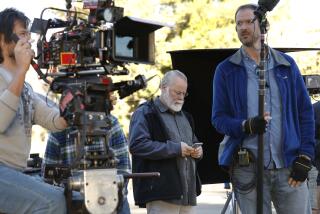Ford Unit Suspends Commercial Filming
- Share via
In a victory for actors striking the advertising industry, Lincoln Mercury on Wednesday said it will stop filming commercials for its 2001 models until the emotionally charged labor dispute is resolved.
Lincoln Mercury is the first high-profile company to announce it has stopped filming ads as a result of the 7-week-old strike by the Screen Actors Guild and the American Federation of Television and Radio Artists. Lincoln Mercury is part of Ford Motor Co.
The decision by Irvine-based Lincoln Mercury, which uses Y&R; advertising agency, came a day after actors picketed a Lincoln Mercury commercial shoot in Palm Springs, accusing the company of racism for allegedly using blackface on a white stunt driver during filming.
Lincoln Mercury vehemently denied the accusation, saying that the practice of silhouetting stunt drivers by dressing them in dark clothes and using dark makeup is common. Company spokesman Tom Mattia added that it is done so that the car, not the driver, stands out in an ad.
Nevertheless, Mattia said, the company elected to “remove ourselves as an emotional flash point” in the SAG dispute.
“We understand how emotional this is. At the end of the day, this is a labor issue, and we want the labor issue to be settled so we can all go about our business,” Mattia said.
SAG spokesman Greg Krizman welcomed Lincoln Mercury’s decision, adding that the union hopes other companies will follow suit.
As for the auto maker’s rejection of the racism accusations as unfair, Krizman acknowledged that “it’s impossible to say” if Lincoln Mercury was darkening the driver’s face to appear African American or for other reasons.
Actors, who have been thwarted by the ad industry in their efforts to force a settlement, are targeting individual companies, hoping that they in turn will pressure the ad industry to settle.
Actors are now paid each time a commercial runs on network TV. They want that arrangement extended to the growing cable TV market, where they now receive a flat fee. The ad industry, citing the fragmented TV audience, wants to pay actors a flat fee for ads on both cable and network TV.






